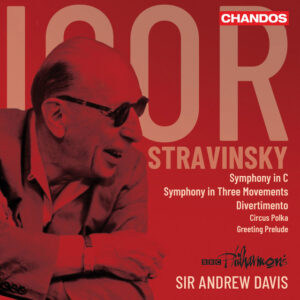GRAMOPHONE Review: Stravinsky Symphony in Three Movements, Symphony in C etc. – BBC Philharmonic/David
 It’s easy to underestimate the depth and breadth of Andrew Davis’ repertoire and indeed his sterling qualities as a conductor – his ebullience, his robust sense of rhythm and razor sharp ears. All of which is much in evidence in this generous compendium of Stravinsky kicking off with a universal birthday greeting (actually penned for Pierre Monteux’ 85th) and ending with the sucker-punch of a D-flat sixth chord as unexpected as it is emphatic. Doesn’t that just sum the composer up.
It’s easy to underestimate the depth and breadth of Andrew Davis’ repertoire and indeed his sterling qualities as a conductor – his ebullience, his robust sense of rhythm and razor sharp ears. All of which is much in evidence in this generous compendium of Stravinsky kicking off with a universal birthday greeting (actually penned for Pierre Monteux’ 85th) and ending with the sucker-punch of a D-flat sixth chord as unexpected as it is emphatic. Doesn’t that just sum the composer up.
If I have a criticism of Davis it lies with his clear-headed objectivity. That, of course, sits perfectly well with Stravinsky who takes a step back from pretty much everything and is cool and dispassionate while all around him are losing their heads. But then again his sensational Symphony in Three Movements is highly emotive beneath a steely resolve and brutalist angularity. This is the composer’s ‘War and Peace’ in three movements inspired by wartime newsreels and a rather redundant brush with Hollywood over a movie called The Song of Bernadette and it’s the last thing we hear on the disc.
I guess I was anticipating – based on what had gone before – that Davis and the BBC Philharmonic would knock it out of the park. That Chandos engineering alone would deliver punch and clarity and wow factor. But for all its incisiveness – piano and timpani vividly kicking the mechanistic first movement to touch – it never quite leaves the ground. Turn up the heat, I kept thinking; this music means something beyond its rhythmic abstractions. Those horn whoops in the goose-stepping finale are euphoric in spite of themselves – I shouldn’t be thinking how immaculate they sound. Of course, it still amuses me that Stravinsky imagined that the sensuously perfumed music of his slow movement might underscore Bernadette’s vision of the Virgin in the aforementioned Hollywood movie. I don’t think so.
The rest of the disc gave me much more pleasure. Davis is thoroughly in step with the neo-classical guise of the Symphony in C, tapping into its Haydnesque quirkiness and eagerness to wrong-foot and to surprise. He and his band positively bounce over the profusion of accents and rhythmic displacements. And as the oboe-led pastorale of the slow movement dreamily transports us to Anne Truelove’s garden in The Rake’s Progress one is reminded how and why this opera has become something of a calling card for Davis.
And then we’re at the ballet. Divertimento is the Suite fashioned from Stravinsky’s The Fairy’s Kiss (1928) where the great Tchaikovsky is both the source and the recipient of a heartfelt homage. It’s amazing how despite the ‘borrowed’ tunes and starling allusions to Tchaikovsky’s style (those pert woodwinds on pointe) the piece remains resolutely Stravinskian. Terrifically characterful playing here from the BBC Philharmonic (not least some marvellously concerted work from the horns in the Danses suisses section) and real luminosity where Tchaikovsky becomes omnipresent in the Pas de Deux. Of course, he would have made more of a meal of it. That was never Stravinsky’s way.
You May Also Like

GRAMOPHONE Review: War Paint – Original Broadway Cast Recording/Frankel
23/05/2018
COMPARING NOTES with JACOB FOWLER
23/03/2023

